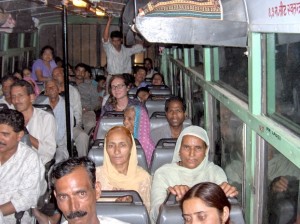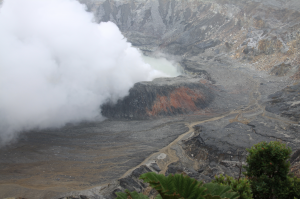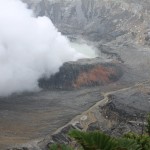For long holiday tourism has been in the grip of economic thinking and sociological research. On this webpage a more balanced view is maintained on the focal centre of tourists' activities: tourists themselves and their encounter with their holiday destination. Tourists take what is given to them and then turn it into their own ends; it is these ends what is of our primary interest and more than 25 articles on this site are about just that: the tourists' tourism.
Under the heading "Tourism" a new article has been added on Climate Change (July, 2020)
and also under the heading "Tourism" I have added a new article about Phenomenology and Tourism (Feb. 2020).
The Experience in tourism
The Experience
The intake and processing of ImpCal produces an experience. This processing does not take place within seconds; to the contrary, it may take up to weeks to assimilate impressions, to sort out data in one’s memory and to apply criteria through one’s referential framework. One of the reasons is that a person absorbs impulses (ImpCal) using many senses simultaneously. To sort out the material and forge it into an experience simply takes some time, because our two brain hemispheres work differently.
What an experience really is within the framework of tourism is a matter of psychology. In general we can state that the holiday experience first concerns the moment of living an experience, whereby later certain personal values are added together with images, smells or other intake through the senses (ImpCal), forming a nucleus in our memory to be used subsequently for comparison with other experiences.
The experience has three functions in tourism:
A recapitulation of the moment of living the experience in the form of images and emotions;
A recording that enables us to compare the experience with expectations and for developing new travel plans;
The comparison with the home environment, which may be viewed differently on the basis of these experiences; the result of this comparison may turn out to be positive or negative for our home environment.
Based on the ways ImpCal enter the body as described above, we can distinguish a series of experiences resulting from them:
social experiences
spiritual experiences
physical experiences
aesthetic experiences
emotional experiences
audiovisual experiences
gastronomic experiences
cultural experiences
To what extent do these experiences differ from other experiences in life? To answer this question we can apply two conditions to tourism: in order to “consume” the tourist must first travel to a destination that is different from his home environment and secondly, the consumption has to be based on the voluntary choice of the tourist to live a certain experience. This voluntary choice may be based on the desire for leisure, biological interest, education, anthropological curiosity or any other reason why this person may want to have a holiday, including sports events or wine tasting.
There are many types of experiences and there are many ways to achieve them. For example, there are the gastronomic experiences. The need for daily food may be a simple one, but in tourism this issue is more complicated than it looks, since the tourist wants to eat something different from what he is used to eating at home. The tourist wants to have something typical from the area, but it shouldn’t be too unusual; the meal must still appeal to what the tourist is used to, otherwise he may lose his appetite. A gastronomic experience therefore contains a cultural element. Not only does the palate need to be satisfied, the same holds true for the ear: the rumbling of a volcano, the pandemonium of a tropical forest, bird songs or a concert are all ImpCal sources, leading to beautiful, impressive or scary experiences.

Public transport – on the photograph in India – is a sure way of having social experiences with the locals.
Another story involves socio-cultural experiences. On one hand we are talking about contact with a local population, and on the other hand about the observation of that population’s cultural expressions. The latter has to be interpreted in a broad sense: it is about local architecture, the colour of houses, the layout of a village or town, the shops and what they sell, and how people are dressed. It also concerns religious expressions in churches or temples, and even in the streets. It is about the cultural heritage made visible through museums, in homes, on the street, via books or photographs, and so on. Simply observing how other people live and have lived may be a source of ImpCal intake through a number of senses during a certain period, which may be forged together into one single experience. It may refer to simple things: the image of a woman carrying a bucket of water on her head walking at a gently swinging pace; it may concern complex matters, such as the mystique of a Buddhist ceremony. The sensation of absorbing a certain atmosphere is therefore one that involves all the senses during a certain lapse of time in forming a complete picture, often referred to as the atmosphere of a place.
In the area of spiritual experiences, a tourist may gain more than he thinks; simply seeing nature in all its grandiosity may give us a feeling of how small we are. In general, confrontations with things that are different may be a good motive for the tourist to become more self-aware.
On a cultural level, the most dominating experiences are visual ones, although social experiences run a close second and tend to dominate as well. However, it should be appreciated that a tourist’s social experiences are usually with other tourists. In other words, ImpCal are taken in as a result of these contacts and this may lead to a series of social experiences. It seems that the destination only serves as decor in these cases and we may have to ask to what extent this behaviour falls within the limits of what we call tourism. People have holidays to be away from their home environment. Most fellow travellers have the same intention, so they all have something in common. The other tourists are often from areas or countries different than the tourist himself or they may be from distinct social strata. In other words, tourists meet people from their own or neighbouring countries who they otherwise might never have met and in this case the holiday destination country serves merely as a vehicle for tourists to meet up. We find the most striking examples of this in the world of group travel; backpackers are another case. The question of to what extent tourists select a holiday just to meet fellow travellers is difficult to answer. In any case, these kinds of social experiences do play an important part in modern tourism. Apart from this we can also mention the phenomenon of a group of tourist living a wild adventure together (either planned or as the result of a mishap); in this case, a strong feeling of solidarity may grow within the group, obviously enhancing social ImpCal intake.
It is difficult to measure the amount of ImpCal consumed. What we can see is to what extent a certain quantity of ImpCal influences an experience. We cannot talk about ‘big’ or ‘small’ experiences, but perhaps there are ‘profound’ and ‘superficial’ ones, although these refer more to emotional values. A deep and unforgettable impression is the one that pushes aside others and becomes dominating. “When we arrived at the Iguazu falls, I shall never forget the moment we saw the water thundering down …” Those are the events that cause us to exclaim “Wow!”, hence we call them the wow-moments. With those commanding experiences, one thinks of impressive things that form an unforgettable spectacle and remain stamped in the memory for ever. However, we are not necessarily talking about deeply emotional experiences.

Looking into the chimney of an active vulcano is a real wow-moment for anybody, usually leading to an unforgettable experience.
This brings us to the point that a certain quantity of potential ImpCal may lead to more dominating experiences with one tourist, but not with another. Sometimes the word soundboard is used: some portions of ImpCal intake may resonate more with one person than another, because of differences in their respective referential frameworks and memories.
We generally assume that the experiences gathered by a tourist are positive in nature – pure enjoyment. The idea of enjoying something is ImpCal intake combined with attitude, which leads to a positive experience; so all we see is presumed to be wonderful beforehand. Obviously, different types of experiences exist and a tourist can also have bad experiences, connected with concepts such as anger or indignation, or even fear. A bad experience at a certain moment – a fall, an illness, a mugging, etc. – may produce a long term aversion to certain circumstances. Then there may be fears in the tourist himself that impede proper ImpCal intake, leading to negative experiences when absorbed; we are referring to cases such as acrophobia, hydrophobia and claustrophobia.
Another expression we may encounter among tourists is that of boredom, which indicates that a tourist wishes to absorb ImpCal but none are available. For lack of potential ImpCal, the tourist may start to look around for something to do somewhere, which often results in finding social contacts. However, these kinds of social experiences should not be confused with those of people who are looking for contact on the basis of a certain fear of the environment they find themselves in.
If a tourist has attempted to take in ImpCal but feels that he has had no experiences at all, there is a good chance he will be disappointed and may even start to complain. The disappointment occurs when expectations do not coincide with what one actually experiences. In other words, we are talking about a lack of ImpCal intake.
The value of an experience may be measured by its cost and there are people who have their holidays spoiled when they think about how much they spent. This is a social problem rather than an element that influences ImpCal intake. If a certain tourist product (ImpCal source) happens to be expensive, the tourist expects a good number of quality experiences. Thinking of the Galapagos and the steep prices charged for the tourist packages there, tourists obviously expect to have ‘the experience of a lifetime.’
How many experiences does a tourist want to have? Does he really want to walk around all day looking for some ImpCal intake? Usually not. And sometimes the opposite is true: tourists entering a forest to spot birds like the famous Quetzal become so keen on seeing it they do not look around at all, missing out on a lot of ImpCal intake. By the end of the day, there are those who spotted the bird and those who did not. The unfortunate ones who did not see it are thoroughly disappointed and had a lost day, in spite of the fact they hiked through one of the most beautiful cloud forests in the world. Obviously, during beach stays ImpCal intake is more limited and this is a conscious decision made by the tourist.
Does ImpCal intake change the tourist? During his trip the tourist will gain a number of experiences and he will be a bit poorer financially afterwards – as is the case with any economic transaction. The intake of ImpCal from a ImpCal source enriches the body and the mind. We assume the tourist will also have some moments of relaxation. The tourist needs some time to process all the ImpCal taken in, but not that alone. An important part of the concept of a holiday is that a tourist is far away from his home environment and physically speaking, in a different place. This creates an opportunity for a tourist to ruminate on his worries and the problems of his daily life back home. A holiday may allow him to distance himself from his daily troubles and gain perspective. Additionally, holidays may contain some physical and sports elements that are an excellent counterbalance to boring, sedentary office work in the home country. ImpCal intake may be the main item of a holiday; the element of mentally refreshing oneself is a certain kind of an experience and may enrich the quality of a person’s life. There is another possibility, as well; some tourists return home with the feeling that nothing is more beautiful than their own country – this home-sweet-home feeling is yet another type of experience.
Having an experience is one thing, but how to ventilate or talk about it is a completely different story. We are talking about remembering and the capability of expressing oneself. While ImpCal intake and its processing is a complex matter, recounting experiences is just as complicated and it can often be clouded by factors such as to who one is telling the experiences. It may happen that two people live the same adventure more or less, but each one has a different ImpCal intake; or perhaps they will have consumed roughly the same ImpCal, but they process them differently. Two people live the same adventure, but back at home each one tells a different story about it. Additionally, it is quite likely that when they tell their holiday experiences at work, the stories may sound quite different, ‘tall tales’ if you will. Another example is that of the shy or introverted tourist who, after a gripping holiday adventure, responds that “it wasn’t too bad.” Quite possibly this tourist consumed lots of ImpCal and processed them accordingly, but he simply does not master the skills needed to express himself regarding his experiences and he may also be affected by the person to whom he is talking. In other words, in talking about his holiday experiences, there are the elements of a tourist’s personal expression skills as well as the influence of the person to whom he is speaking. There is a third factor at work, and that is time. Having an experience fresh in mind may make it of great importance to the tourist, but as time passes there is a tendency for experiences to submerge, meld with others, or be approached from another angle. Experiences are not static and one must always take into account that one tourist may tell different stories on different days to different people.
» This website is not commercial and does not generate income; therefore for those who actively use its content we appreciate a voluntary contribution, small or symbolic as it may be, by pressing the DONATE button (Paypal system) at the bottom of this page «
All rights reserved. Complete or partial reproduction is prohibited without the permission of Marinus Gisolf and without mentioning the source.

